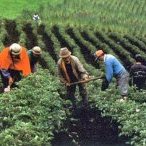English · Español

9 de octubre de 2014 | Entrevistas | Encuentro Monocultivos en América Latina | Acaparamiento de tierras | Bosques y biodiversidad | Soberanía Alimentaria
The curse of abundance: Interview with Nathalia Bonilla (Acción Ecológica) about the deepening of the extractivist model in Ecuador
Descargar: MP3 (2.4 MB)
Since 2008, the Ecuadorian government has been developing a series of initiatives to establish a policy for agrofuel production in the country , with the financial support of USAID. Nathalia Bonilla, member of the organization Acción Ecológica talked about the reasons behind these initiatives, the mechanisms used, the consequences it implies in socioeconomic and environmental terms for rural and indigenous communities of the country, and the meaning of the implementation of the monoculture model for the political sovereignty of the country.
Bonilla participated in the "Latin American Meeting on Large Scale Monoculture Plantations in Latin America: land grabbing and threats to biodiversity and food sovereignty", held at La Ceiba, Honduras, from September 6-11, organized by Alianza Biodiversidad, Friends of the Earth Latin America and the Caribbean (ATALC) and the World Rainforest Movement (WRM) together with the Honduran Black Fraternal Organization (OFRANEH).
When speaking of the monoculture production model in the different Latin American countries, the Ecuadorian activist said that "despite each country going through special circumstances there is a common factor: There is a system. We are responding to something that has already been planned without taking us into account. A model that has placed us as producers. They have always considered us as raw material producers. Raw materials for others. And now we are returning to this: we are becoming a place where wood is produced to make paper that we are not going to consume. We are responding to the demands of others".
With a similar logic, but including other supposed benefits, we can find monoculture plantations for the production of agrofuels: "They make us produce palm oil for their cars; for cars that are not ours, and to solve crises that we haven´t caused, such as climate change".
Intensification of the extractivist model
Nathalia Bonilla told us that her country is deepening its every typical extractivist model. "Oil exploitation, previously limited to the North of the Amazon, has now advanced to the Central-South areas; the country has opened itself to megamining, which we didn´t have before; and the forestry model is being intensified with pine, eucalyptus, teak, balsa trees and African oil palm".
The claims of indigenous and environmental social movements in favor of a post-oil Ecuador, according to Bonilla, have been co-opted by the government in a way to justify the advance of monoculture plantations: "It is like they are proposing to "intensify extractivism in order to abandon extractivism" which is very hard to understand", said the activist.
About the socioenvironmental impacts caused by monocultures to produce agrofuels, Bonilla highlighted the reduction of water in the high mountain ecosystems: "These are agricultural lands and it is affecting people; if you grow eucalyptus monoculture plantations at a height of 3,200 meters, the volume of water is reduced below. And the water held in the high mountains is the water that goes to the Amazon, it is the water that goes to the coast where the main lands for the food sovereignty of the country are located. And this is being ignored".
Imagen: noticias.masverdedigital.com








